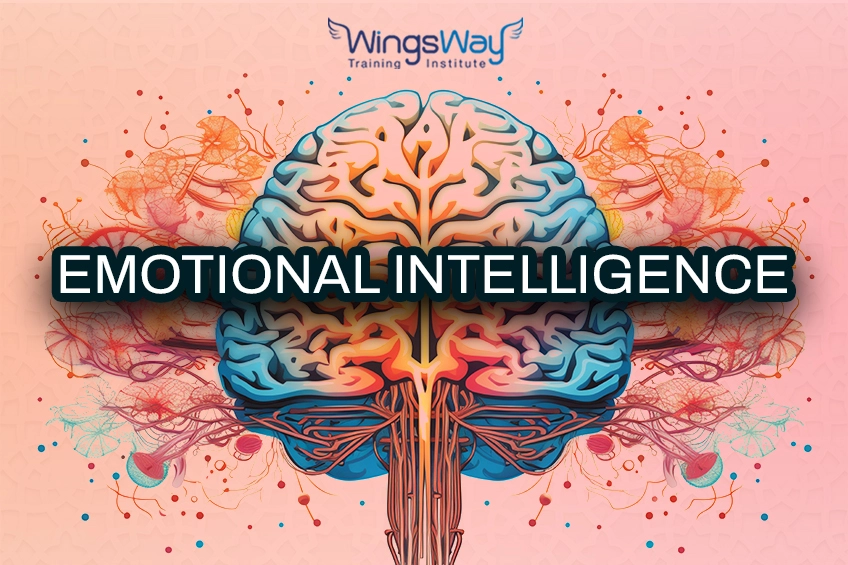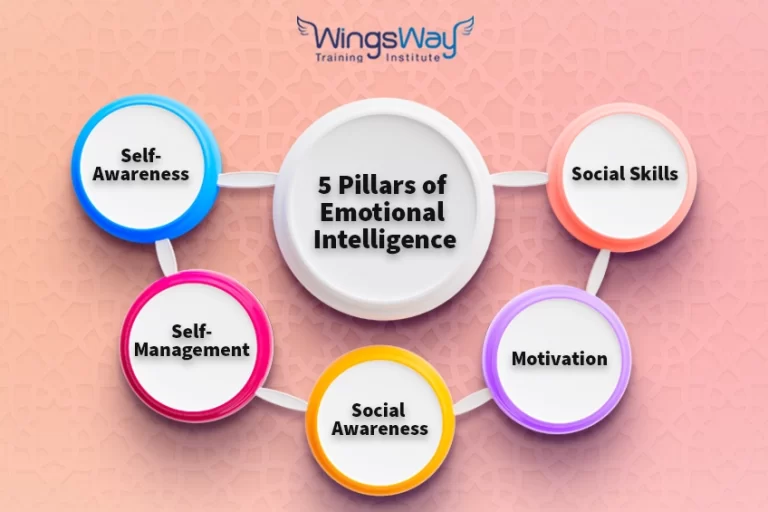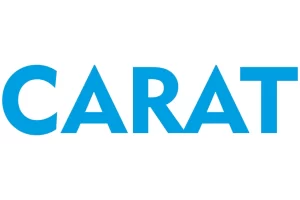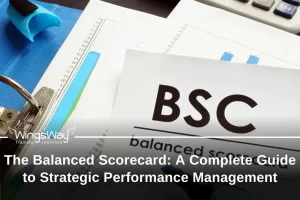
Mastering Emotional Intelligence in Workplace | Meaning, Importance, Case Studies
- Posted by WingsWay Training Institute
- Categories Soft Skills, Corporate Trainings
- Date 15/04/2024
Emotional Intelligence (EQ) is the secret weapon of many high achievers. Imagine two equally competent project managers. One consistently builds strong teams, navigates difficult conversations, and delivers projects exceeding expectations.
The other struggles with conflict, creating team friction and missed deadlines. The difference? Emotional intelligence (EQ).
This blog explores what EQ is, why it matters, and how it drives both personal and professional success with successful case studies.
Table of Contents
ToggleWhat is Emotional Intelligence?
Emotional intelligence (EQ), often referred to as emotional quotient, is the ability to understand, use, and manage your own emotions in positive ways. Crucially, it also encompasses recognizing, understanding, and influencing the emotions of others.
As psychologist Daniel Goleman famously phrased it, “EQ is the sine qua non of leadership.” While IQ gets you in the door, it’s often EQ that helps you climb the ladder.

Key Components of Emotional Intelligence
Psychologist Daniel Goleman popularized a framework for understanding EQ that encompasses five core components. Let’s explore each one to see how they contribute to overall emotional intelligence:
Self-Awareness
Self-awareness is the ability to accurately identify your own emotions, thoughts, and values, and understand how they influence your behavior.
By understanding your emotions and how they impact your thinking, you can avoid decisions driven by negativity or impulsivity.
We all have biases, but the key is being aware of them so we can prevent them from clouding our judgment.
Self-Regulation
Self-regulation is the ability to manage your emotions and impulses constructively. It’s about thinking before acting, not suppressing emotions.
When you can regulate your emotions, you’re less likely to react impulsively or say something you’ll regret later.
From handling demanding deadlines to navigating difficult conversations — Self-regulation allows you to remain calm and collected under pressure.
Empathy
Empathy is the ability to understand and share the feelings of others. It goes beyond sympathy, requiring an effort to put yourself in someone else’s shoes.
When you can see things from another person’s perspective, you’re better equipped to identify the root cause of conflict and find solutions that address everyone’s needs.
Motivation
Motivation in an EQ context refers to intrinsic drive — a desire to achieve for the sake of accomplishment and self-improvement.
When you’re driven by a desire to learn and grow, you’re more likely to set ambitious goals, bounce back from setbacks and keep pushing forward.
Social Skills
Social skills encompass the ability to communicate effectively, build relationships, and navigate social situations.
When you can communicate effectively, actively listen to others, and manage conflict constructively, teamwork becomes more efficient and productive.
You’ll develop strong networking abilities, meaning you can build rapport with colleagues, clients, and potential collaborators. This can lead to new opportunities, increased access to information, and stronger professional relationships.

Importance of Emotional Intelligence in the Workplace
A study published in Psychology Today found a significant correlation between emotional intelligence and improved job performance, with workers exhibiting higher levels of EQ demonstrating a 40% above-average job performance rating.
Having a high level of emotional intelligence (EQ) isn’t just a soft skill – it’s a competitive advantage. Whether your ambition is to rise to a leadership role or be a top contributor on your team, EQ can set you apart.
Moreover, high-EQ teams exhibit increased productivity and collaboration. Investing in EQ-boosting training for your entire workforce isn’t just feel-good, it’s smart business.
Let’s explore why EQ is so crucial in the workplace:
1) Enhanced Decision-Making
People with high EQ are better equipped to make sound decisions under pressure.
They can manage their emotions, weigh factors objectively, and consider the long-term impacts of their choices.
2) Stronger Social Relationships
EQ is the foundation for building trust and rapport with colleagues, clients, and stakeholders.
By being empathetic, actively listening, and managing conflict constructively, you create a positive and collaborative work environment.
3) Effective Leadership
Leaders with high EQ are better at inspiring, motivating, and guiding teams toward success.
A Harvard Business Review study found that executives with strong EQ are more likely to be seen as high-potential by their organizations.
4) Increased Resilience
People with high EQ are better at managing stress and bouncing back from setbacks.
When faced with challenges or disappointments, they can regulate their emotions, tap into their intrinsic motivation, and find constructive ways forward.
5) Improved Customer Service
Emotionally intelligent employees can better understand customer needs and frustrations, leading to more positive interactions. This builds loyalty and can translate to improved customer satisfaction ratings.
These benefits aren’t just theoretical. Let’s look at real-world examples of how companies have leveraged EQ to enhance performance, profitability, and overall workplace culture.
3 Case Studies: How EQ Helped in Profitability & Performance
Here are 3 case studies of how some globally known brands have used Emotional Intelligence to improve employee job performance and organizational profitability.

Sky
Sky, a media company, faced challenges in attracting and retaining top talent within a competitive industry. Additionally, they recognized the need to foster a culture of innovation and growth among their employees.
EQ Skills Applied: Sky implemented a tailored EQ Leadership Development program for its employees. This program likely emphasized self-awareness, empathy, and relationship-building skills – essential for creating an environment where people feel valued, understood, and motivated to grow.
Measurable Results:
The EQ program resulted in several positive outcomes:
- 25% increase in empathy, facilitating stronger connections between leaders and their teams.
- 21% improvement in relationship skills, enhancing collaboration and workplace dynamics.
- 15% overall increase in emotional capital, indicating a workforce better equipped to manage emotions, be resilient, and contribute to a positive culture.

Carat
Carat, a global media network, conducted a proprietary research study called the Brand EQ Index. This study aimed to rank and reveal the world’s most emotionally intelligent brands. It was found there was a strong correlation between a brand’s emotional intelligence (EQ) and its business performance.
EQ Skills Applied: Carat’s Brand EQ Index measures a brand’s ability to demonstrate empathy, self-awareness, and social skills. Essentially, the study assesses how effectively various brands connect with consumers on a human level.
Quantitative Results:
Carat’s research yielded compelling insights:
- Brands with high EQ significantly outperformed the S&P’s (Standard and Poor’s) share price average.
- Over a decade, high-EQ brands outperformed by 500%.
- By the end of 2021, that figure rose to an astonishing 900%!.

Motorola
Motorola is a global telecommunications company, recognized the impact of workplace stress on employee productivity within their manufacturing facilities. They aimed to find solutions to mitigate stress and enhance overall well-being.
EQ Skills Applied: Motorola implemented a training program that focused on stress management techniques and understanding stress triggers.
Measurable Results:
- As a result, 93% of employees who participated in the training demonstrated increased productivity.
- By helping employees manage stress and improve their emotional intelligence, companies like Motorola are able to enhance job performance, increase productivity, and ultimately, boost profitability.
Empower Your Team!
Emotional intelligence (EQ) is a powerful driver of both personal and professional success. In the workplace, EQ fosters collaboration, improves decision-making, and strengthens leadership.
The good news is, EQ isn’t fixed – it can be developed and strengthened through training.
Investing in EQ skill-building for your workforce has the potential to enhance performance, boost productivity, and ultimately increase profitability.
WingsWay Training Institute is an award-winning and ISO-certified training centre trusted by learners across the globe. We offer various Corporate Training Solutions specifically designed to improve team performance an company profitability in the workplace.
If you’re a professional wanting to level-up your EQ or a manager committed to developing your team’s potential, connect with our Training Solutions Specialists. We’ll provide personalized guidance on the best course options for your goals.
- Landline: +971 4 222 0885
- E-Mail: [email protected]



